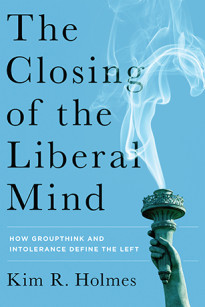In the Wall Street Journal’s review of The Closing of the Liberal Mind, Michael Warren explains how today’s liberals use the mantles of progressivism and pluralism—not to foster social justice or equality as their forebears did—but to secure power for themselves and to damage their enemies. Warren writes:
Mr. Holmes, a scholar at the conservative Heritage Foundation, does an admirable job of reminding readers of [liberalism’s] intellectual history, drawing a line from the political philosophy of John Stuart Mill to the original progressive spirit of Herbert Croly and Woodrow Wilson to the Third Way liberalism of John Rawls and Bill Clinton that synthesized Wilsonian progressivism with Mill’s classical liberalism. This tradition is communitarian, pluralistic, rational and universal. It idealizes freedom of thought and speech, distrusts institutional power, and believes in the goodness of humanity.
Today’s postmodern progressives have only superficial similarities with these liberal forebears. They are more accurately the descendants of radical abolitionists like William Lloyd Garrison; radical egalitarians, like the utopian socialist communities of the 19th century; and egalitarian anarchists like Lysander Spooner and Benjamin R. Tucker. Like those radicals, postmodern progressives “sanction the use of coercive methods, either through legal means or public shaming rituals, to deny certain people their rights and civil liberties . . . in ways that undermine American democracy and the rule of law.”
Perhaps the fundamental difference between yesterday’s liberals and today’s postmodern progressives is each side’s conception of truth. Liberals believe truth is external and can be determined through reason. A good liberal uses his reason to achieve justice and equality for all. But postmodern progressives are moral relativists. For them, truth is internal, discerned by and specific to particular individuals. Today a good progressive defends the individual’s internal truth—particularly if the person is an “oppressed minority”—against all foes, including reason. Small wonder that the postmodern left has turned on its own.
The competition between individualized truths—“an unending conflict between identity tribes trying to capture the state for their own narrow group interests”—is what Mr. Holmes believes makes postmodern progressivism a cousin of radical libertarianism. But while radical libertarianism tends toward anarchy, postmodern leftism has a totalitarian impulse. The goal of a postmodern progressive isn’t universal truth, which supposedly doesn’t exist, but power, which is presented in the guise of equality and social justice. The left’s quest for power isn’t of the goose-stepping, arsenal-building kind employed by 20th-century dictators, Mr. Holmes takes great pains to insist. But, he allows, progressive liberals are “willing to dip into the totalitarians’ illiberal tool box.”
Where classical liberalism’s essential rationalism yielded the notion of the inherent equality of all men, the emergence of moral relativism gave the left a sprawling new identity politics it could use to bludgeon its enemies and elevate the rights of its preferred groups above others.
As Holmes writes in The Closing of the Liberal Mind, social justice has mutated into social vengeance. Today’s left uses the wrongs of the past to perpetrate new injustices in “an arms race of competing bigotries vying to outdo one another in escalating claims of victimhood.”
From The Closing of the Liberal Mind:
Once it is assumed that the government’s place is to establish and maintain a static power structure based solely on fixed social categories, the way to the abyss has been opened. Everything becomes a fight over group rights, which pits one side against another as if they were warring tribes. It is inevitable that such a system should be illiberal. It assumes winners and losers, decided not by open competition but by government fiat. Whereas in a liberal society classes and groups are not supposed to be permanent, in a postmodernist egalitarian society they are not only locked in perpetual conflict; they are openly accepting of the fact that coercion is needed to make sure only the right sort of group wins.
As long as victimhood continues to be rewarded and elevated by the state, postmodern tribalism—and its ambushes on our national unity—is not going away. And that is an outcome that would undoubtedly shock the communitarian liberals of the past.
For more, read the Wall Street Journal’s full review (subscription required)—and listen to our podcast below, where Kim R. Holmes explain how identity politics have balkanized the great traditions of classical liberalism.
